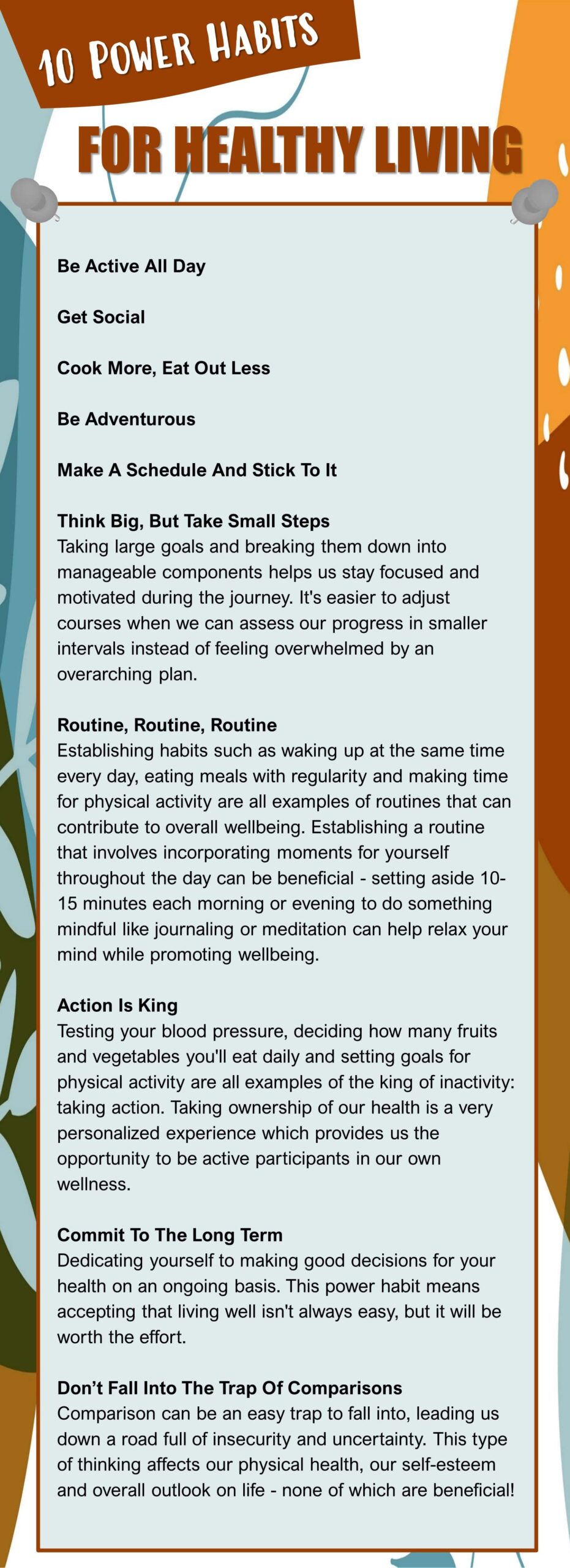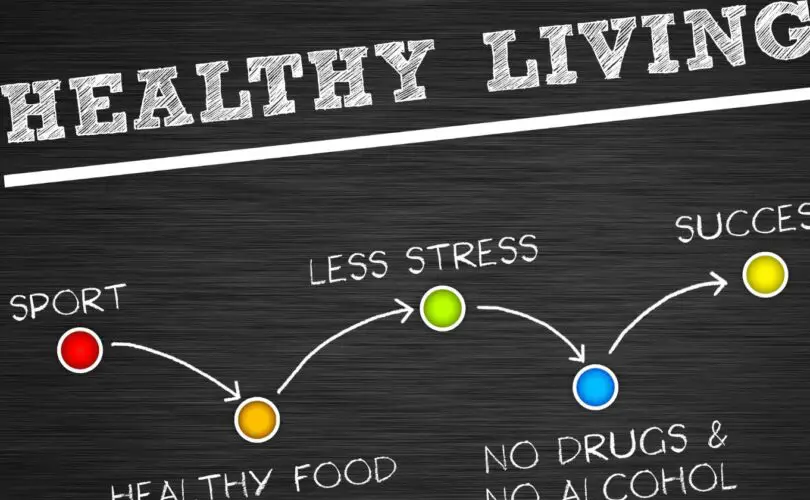Establishing healthy habits can make all the difference in how you feel each day. These 10 Power Habits for Healthy Living aim to help create a well-rounded lifestyle that can benefit overall health, wellness, and productivity.
Whether you’re taking small steps or making more significant changes in your daily routine, this list of 10 Power Habits for Healthy Living provides valuable insight into building a healthier lifestyle that works for you.
1| Be Active All Day
Staying active all day is integral to living a healthy lifestyle. Not only does physical activity help to strengthen your muscles, bones, and heart, but it can also uplift your mood and boost your energy levels. Additionally, regular exercise may reduce the risk of cancer, diabetes and stroke due to increased blood flow throughout the body.
With multiple benefits from habitual physical activity, this power habit could be an important part of your everyday life. On top of that, any form of exercise – from jogging in the park to doing yoga at home – provides us with an incredible opportunity to learn more about ourselves and experience our full potential.
2| Get Social
Getting social is an important power habit for leading a healthy lifestyle. Social interaction has numerous benefits, such as reducing stress, boosting self-esteem, and improving overall mental well-being. It also encourages us to be more active, as we are more likely to engage in physical activities when with friends or family.
Additionally, having fulfilling relationships helps us stay positive and motivated to make healthier choices. Although technology has made social contact easier than ever before, real-world interactions still have the most impact. Make sure you invest time into cultivating meaningful relationships with the people closest to you in your life and enjoy the mental and physical rewards that come from it!
3| Cook More, Eat Out Less
Cooking more meals at home is a great way of establishing healthy eating habits and creating a healthier lifestyle. Making your own food puts you in control of the ingredients you use, allowing for greater variety and portion control. Eating out may often lead to overconsumption – larger servings, high fat, high salt ingredients, and added sugar.
In addition to helping you make better dietary choices, cooking more also brings an array of other health benefits. For example, when preparing your own food, you have the opportunity to practice mindfulness and learn valuable kitchen skills that may serve as a form of stress relief. All this in combination can help create a nutritious diet and a much better quality of life.
4| Be Adventurous
We live in a world filled with opportunity and adventure, yet for many people life has become overly mundane and routine. To tap into the boundless potential available to you, one of the best power habits you can adopt is to be adventurous.
Whether it’s trying new foods or exploring unfamiliar places, stepping outside your comfort zone can build resilience and add vibrancy to your life. Being adventurous is not just about finding wild thrills; it’s also a way to look at life through new perspectives, gain insights, gain skills, make new friends and expand your cultural knowledge.
5| Make A Schedule And Stick To It
Sticking to a schedule is perennial wisdom for leading a healthy life. Allocating enough time for the activities that nourish us—sleeping, exercising, cooking, and eating nutritiously, and spending quality time with family and friends—is essential for feeling energized and fulfilled in our day-to-day lives. Through the creation of an organized daily or weekly regimen, we can ensure these goals are nurtured.
Furthermore, regularity brings about positive results when establishing habits; it conditions our brains to function optimally having certain tasks accomplished at specific times. Schedule-making is thus particularly helpful as it supplies structure conducive to achieving desired outcomes and smooth functioning.
6| Think Big, But Take Small Steps
Taking large goals and breaking them down into manageable components helps us stay focused and motivated during the journey. It’s easier to adjust courses when we can assess our progress in smaller intervals instead of feeling overwhelmed by an overarching plan.
7| Routine, Routine, Routine
Establishing habits such as waking up at the same time every day, eating meals with regularity and making time for physical activity are all examples of routines that can contribute to overall wellbeing.
Furthermore, establishing a routine that involves incorporating moments for yourself throughout the day can be beneficial – setting aside 10-15 minutes each morning or evening to do something mindful like journaling or meditation can help relax your mind while promoting well-being.
8| Action Is King
Taking action is essential when it comes to leading a healthy lifestyle. It’s how we become aware of our own health, notice any changes that may need attention and make plans for what we can do to improve.
Testing your blood pressure, deciding how many fruits and vegetables you’ll eat daily and setting goals for physical activity are all examples of the king of inactivity: taking action. Taking ownership of our health is a very personalized experience which provides us the opportunity to be active participants in our own wellness.
9| Commit To The Long Term
Dedicating yourself to making good decisions for your health on an ongoing basis. This power habit means accepting that living well isn’t always easy, but it will be worth the effort. Habits like drinking enough water throughout the day, preparing healthy meals ahead of time, and getting enough sleep are just some of the ways that you can commit to the long term and create energy, clarity and vigor in your life over time.
10| Don’t Fall Into The Trap Of Comparisons
Comparison can be an easy trap to fall into,
leading us down a road full of insecurity and uncertainty. This type of thinking affects our physical health, our self-esteem and overall outlook on life – none of which are beneficial! To break the habit, we should focus on gratitude for what we do have rather than dwelling on what’s missing from our lives. Setting realistic goals that lead to a successful future is also important in developing positive habits.








